JACKSONVILLE, Fla — Pfizer and Moderna's COVID-19 vaccines have already been shipped across the U.S. by the thousands, but only a fraction of the doses delivered have been administered.
In fact, Florida has received more than 1.3 million doses, according to a CDC dashboard Friday, but less than a third of them have gone into arms.
So, is the clock ticking on these unused doses?
The Pfizer-BioNTech and Moderna COVID-19 vaccines both have a shelf life of up to six months, but Pfizer's requires ultra-cold storage to last that long, the company said in November.
That means Pfizer's vaccine must be kept at about minus 70 degrees Celsius (minus 158 Fahrenheit), which requires a special kind of commercial freezer. The vaccine can only be stored for five days at regular refrigeration temperatures.
Pfizer said the vaccine is being distributed in thermal shippers, which maintain ultra-cold temperatures using dry ice. The vaccine can last up to 30 days by refilling these shippers with dry ice every five days.
On the other hand, Moderna said its vaccine can be stored for up to six months at standard freezer temperatures around minus 20 degrees Celsius (minus 4 Fahrenheit) or 30 days refrigerated at about 2 to 8 degrees Celsius (36 to 46 Fahrenheit).
“The vaccines that we get, we do have people lined up to take them," Chad Neilsen, UF Health Jacksonville Director of Infection Prevention, said. "We know how to give our employees shots. We do it every year for the flu shot to the nature of thousands every year.”
Neilsen said COVID-19 vaccine expiration dates are not a concern for UF Health Jacksonville.
It is all about strategy, he said. For example, the hospital requested from the state the exact number of vaccines it needed in order to give its employees their second dose this week.
“We know how to do this, but do the community, partner agencies?" Neilsen explained, "Does the health department? Somewhat yes, but are they built to give vaccines to 50,000 people over two or three days? Of course not. They're going to need help.“
Neilsen added, to have a successful mass vaccination campaign and avoid spoilage issues down the line, partner agencies will need to ask for additional resources and assistance.

